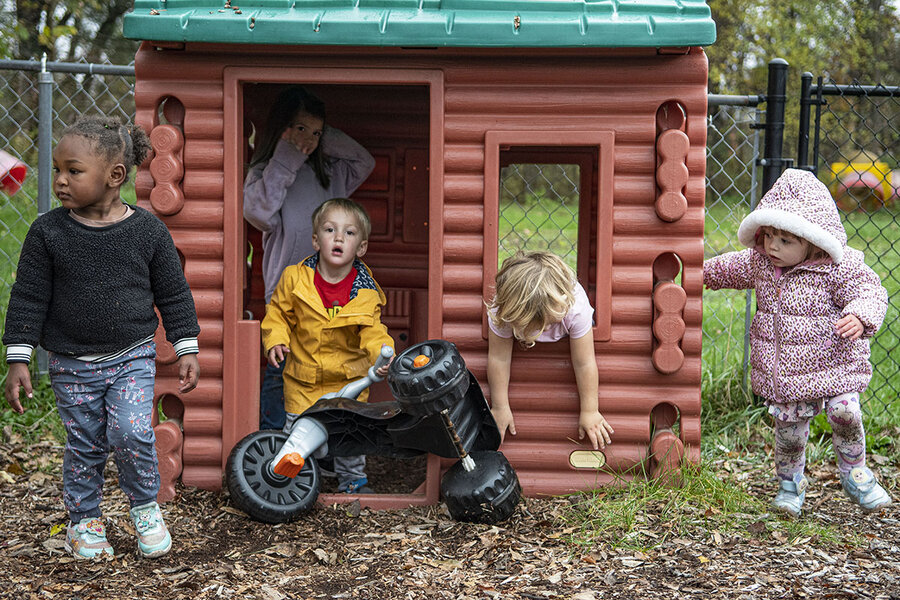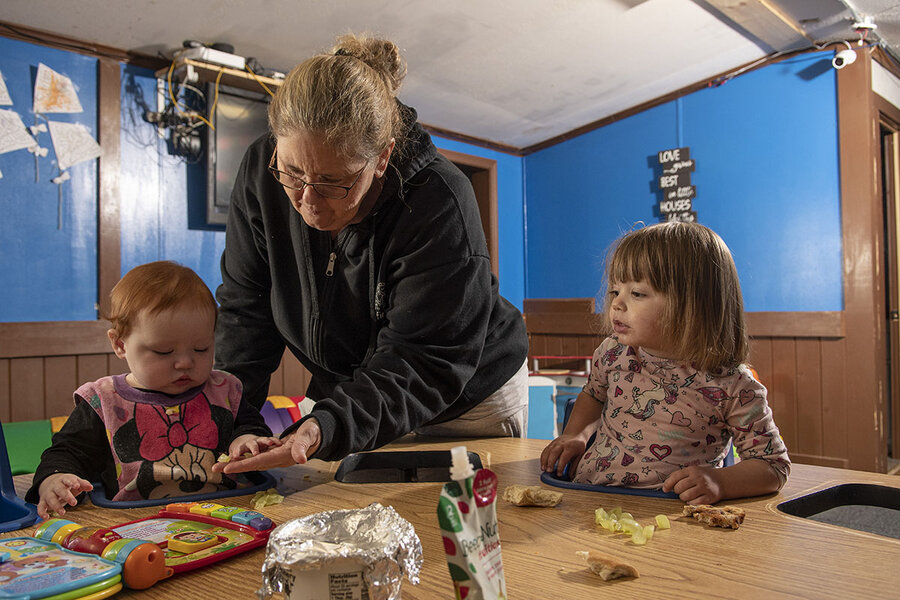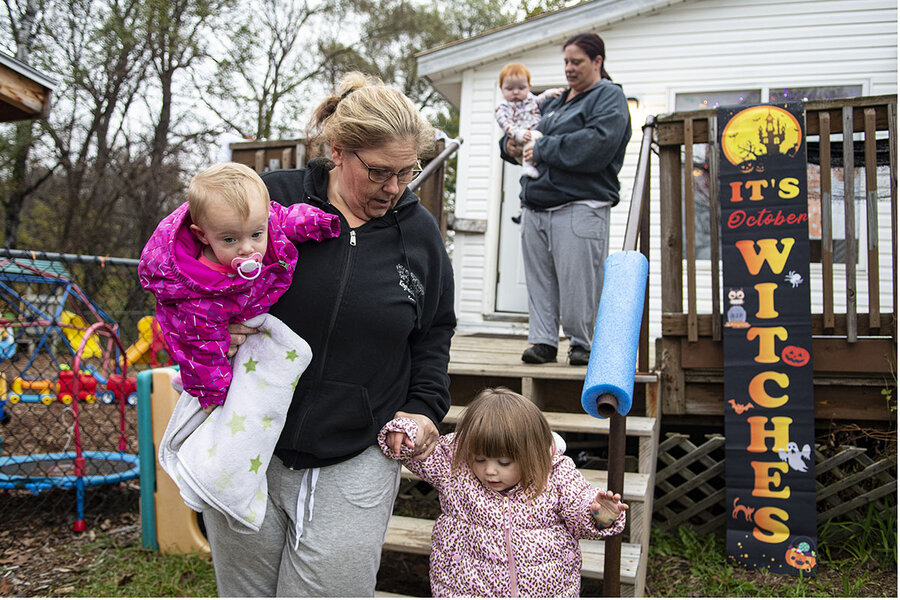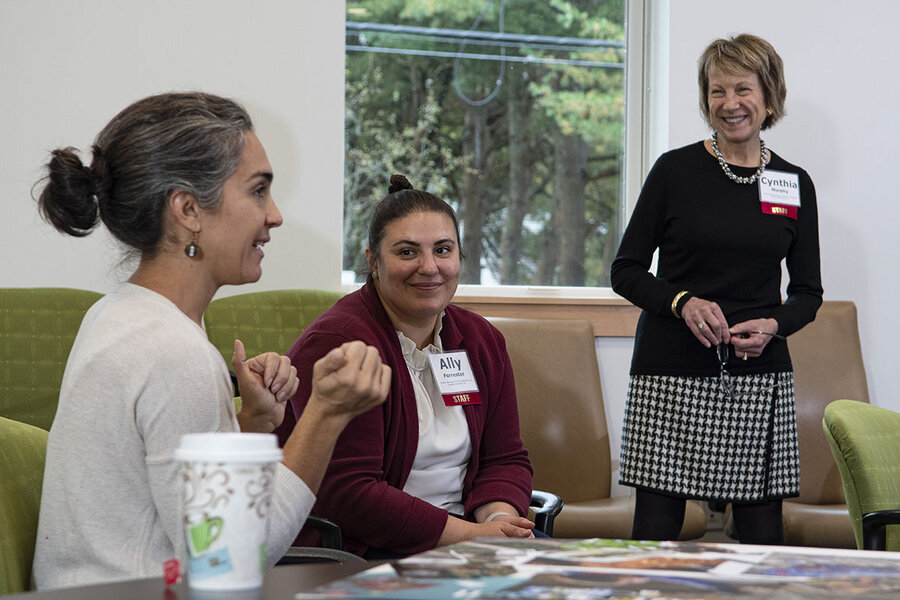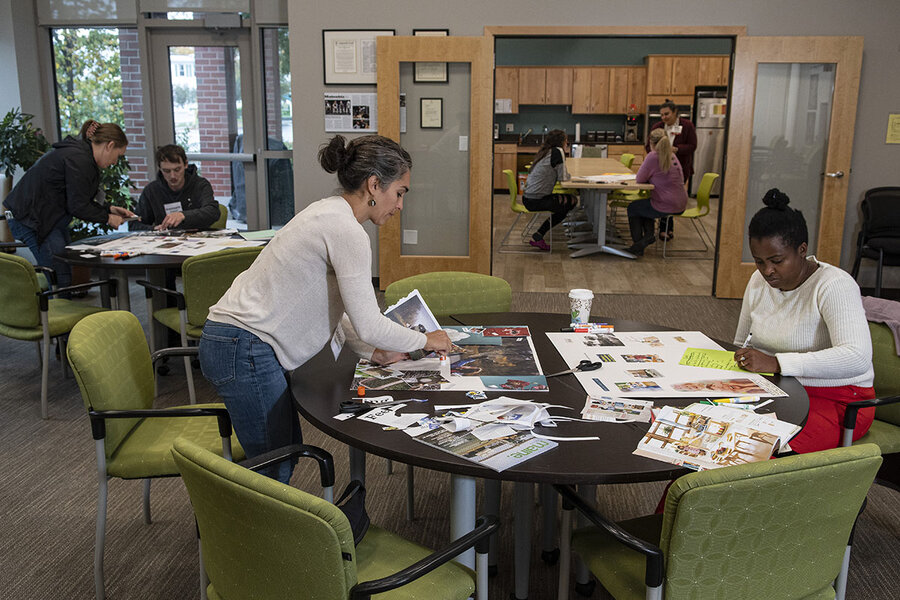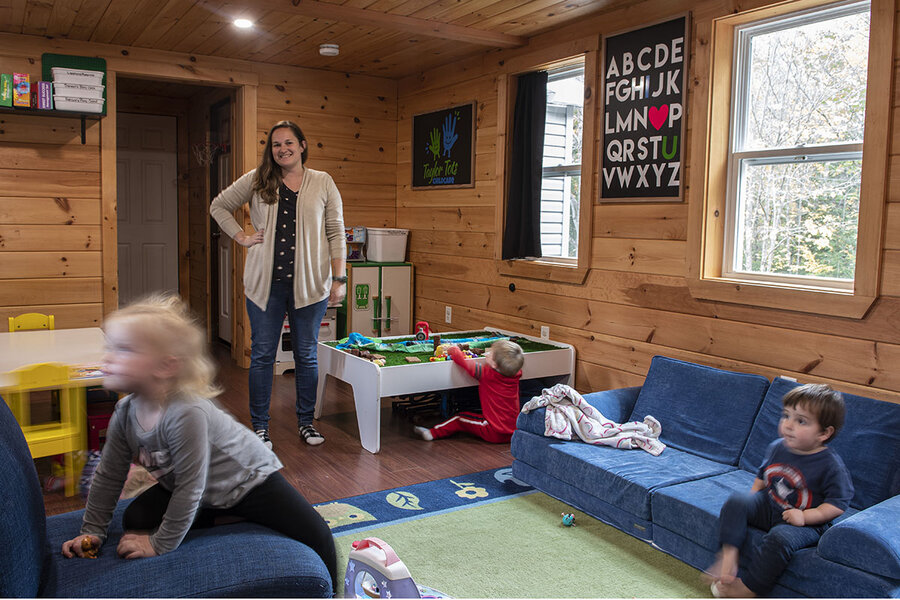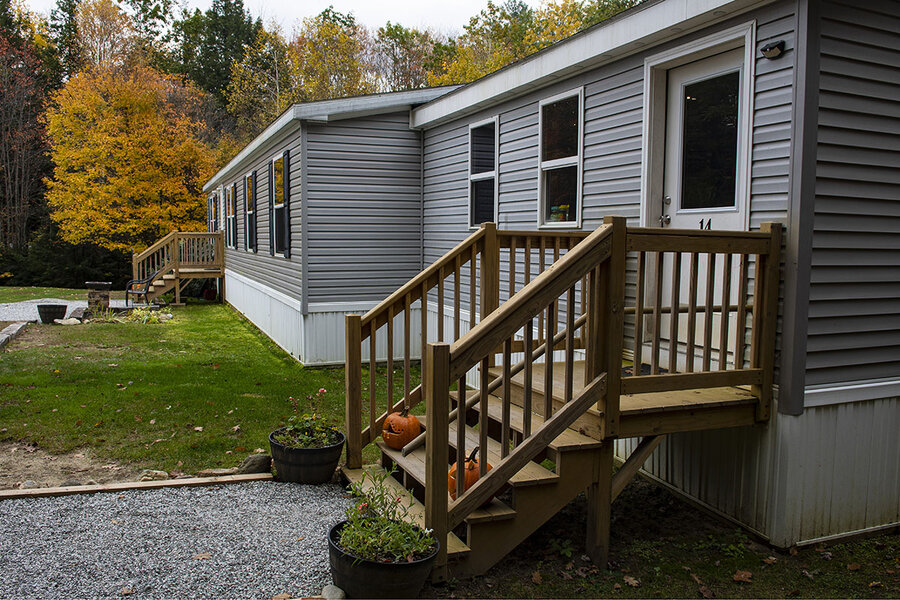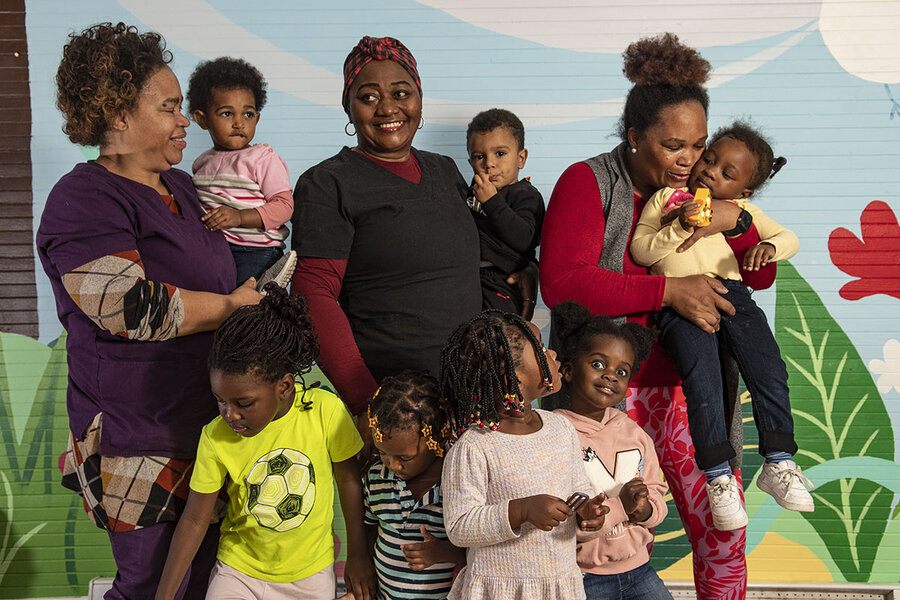Americans need help with child care. One solution is catching on in Maine.
Loading...
| Kingfield, Maine
Miranda Taylor is bucking local and national trends: She has successfully opened an in-home day care.
Taylor Tots Childcare, which started in 2021, operates out of a wood-paneled room attached to her family’s house in rural Canton, Maine. “There’s no commute. I’m here if my kids need me,” she says.
Why We Wrote This
A story focused onThe pandemic brought more attention to the challenges of working parents. In Maine, a new model for expanding day care options is offering one solution to America’s child care need.
On a recent afternoon, Ms. Taylor points to a 2-year-old boy playing in the room. He has been with her since he was 3 months old. His mother needed to return to work but couldn’t find child care in the area. Ms. Taylor saw her post on a local site and offered to enroll him as soon as she could open.
It’s the type of story that Child Care Business Lab leaders hoped would emerge, given the significant need of parents. The program, run by a community development financial institution called Coastal Enterprises Inc., launched in 2020. Since then, lab graduates, such as Ms. Taylor, have started 28 new child care businesses, serving more than 500 children in Maine. Another dozen are actively pursuing licenses.
The economic ripple effect from any new child care business is obvious, says Charlie Woodworth, executive director of Greater Franklin Economic and Community Development, in one of Maine’s counties. “You see it immediately.”
From the outside, the light peeking through a window of the modest one-story home provides the only clue the day has begun at Kingfield Kinder Care.
Inside, Jackie Lobdell dotes on the children already in her care. She serves bite-size grapes and cinnamon bread to two diaper-clad little ones, checks on an older girl reading a book, and keeps an eye on her lively 3-year-old, Emilia, whose energy defies the time on the clock. It’s 6:45 a.m.
The first parent dropped her daughter off at 5:30 a.m. The early start helps fill a need Ms. Lobdell says she witnessed firsthand after she and her husband started fostering “Em,” whom they plan to adopt. Back then, she worked at the Poland Spring bottling plant in this central Maine town that otherwise relies on the logging, recreation, and tourism industries.
Why We Wrote This
A story focused onThe pandemic brought more attention to the challenges of working parents. In Maine, a new model for expanding day care options is offering one solution to America’s child care need.
She and her husband cobbled together a patchwork quilt of child care.
“That didn’t work for my work schedule,” she says. “We were missing a lot of time.”
The experience fueled a longstanding desire to open her own child care center. But the question often holding Ms. Lobdell and other aspiring child care providers back can be summed up in one word: How?
The Child Care Business Lab – run by a community development financial institution called Coastal Enterprises Inc. (CEI) – helped her figure that out. Kingfield Kinder Care opened in 2021.
The approach provides a glimpse into one way that states are addressing the problem of high child care demand and too few providers. Experts say the supply-and-demand mismatch limits opportunities for families and communities alike: Without reliable and affordable child care, parents can’t join the workforce, stunting household financial stability and regional economies.
The business lab zeroes in on the access part of the equation, offering a pathway for those yearning to work in child care. But it’s not a one-size-fits-all approach. The businesses that have emerged exist in houses, commercial space, and immigrant communities where cultural relevance gives parents extra peace of mind.
“We want to meet people where they are and make sure that we’re giving them the support so that they can establish a financially viable child care business,” says Cynthia Murphy, the workforce solutions senior program director at CEI.
Sustainability has come under the microscope as pandemic-era funding dries up. When the pandemic put further stress on the feeble child care system in the United States, the federal government offered a life raft via $24 billion worth of stabilization funds, which expired on Sept. 30. Another $15 billion for the existing Child Care and Development Block Grant program faces a 2024 sunset. By some estimates, the loss of the pandemic-era federal funding could leave more than 3 million children without care across the U.S., further stiffening competition for families seeking placements.
As states and communities seek solutions, advocates say it’s time to start recognizing the problem as a societal, not individual, one.
“When we can figure out how to make it easier to start a child care business – and easier and more sustainable to run a child care business – I think we all win in that situation,” says Anne Hedgepeth, chief of policy and advocacy at the nonprofit Child Care Aware of America.
“We’re here to help you”
On a drizzly Saturday morning in late October, six women fan out across a large room in Brunswick, a coastal town about a half-hour north of Portland. They’re carrying poster boards, glue sticks, markers, magazines, and scissors.
Their mission: create a vision board for their future child care business. What are the sights and sounds? How are kids handling their big emotions? Why are parents choosing this place?
“We’re not here to tell you what your child care should look like,” Alexandra Forrester, the program developer at CEI, instructed minutes earlier. “We’re here to help you understand the regulations and the laws and things that you have to have done.”
It’s the first day of a new cohort for the Child Care Business Lab. Since the lab’s launch in 2020, its graduates have started 28 new child care businesses, serving more than 500 children in Maine. Another dozen are actively pursuing business licenses, Ms. Murphy says.
CEI has been fielding inquiries from outside the state and is hoping to help others replicate the Child Care Business Lab model. “We have funding from Lumina Foundation to create a national learning cohort of other organizations wanting to start similar programs,” Ms. Murphy adds.
The lab grew out of an observation she made while helping Maine businesses find employees. Lack of child care consistently emerged as an employment barrier, Ms. Murphy says. Some parents reported they had tried securing a placement immediately upon learning of a pregnancy – only to still be looking for child care months after their baby’s birth.
“These stories were heartbreaking,” she says. “It just became very clear that if we could increase access to quality child care, we could get more people into the workforce.”
It’s a particularly pressing issue in Maine, where residents’ median age is 44.8, the highest of any U.S. state. The Pine Tree State also has low workforce participation compared with other states, sitting at a seasonally adjusted rate of 58.8% in October, according to economic data from the Federal Reserve. But if the state hopes to attract younger residents who can join the workforce, economic development officials know a key factor will be its child care infrastructure.
The three-month business lab, powered by a combination of federal and philanthropic funding, is free for applicants accepted into the program. The course walks aspiring child care owners through market research, business planning, securing financing, the licensing process, and, ultimately, managing their business. On the money end, aspiring child care providers receive financial advising and dive into the numbers, including calculating start-up costs and the income they need to earn, which may vary by person.
In essence, leaders say, the lab provides a recipe for navigating what could be an intimidating business and regulatory landscape.
“It’s so important for the audience that we’re serving here in child care because these are people who may not have ever even had a loan before,” Ms. Murphy says. “They may have no experience in business.”
For Ms. Lobdell, market research began at her local grocery store. She posted flyers and spoke to shoppers who came and went, confirming her suspicion that more child care was needed, especially in the early morning hours.
After Kingfield Kinder Care opened, Sprite York eventually learned of its existence. On a recent morning, she helps her 2-year-old son, Stiles, remove his Mickey Mouse shoes in the center’s front entryway that was bursting with Halloween decorations. Ms. York previously worked nights, putting a strain on her family life. Child care in the region, she says, is “very far and few between.”
By late November, Ms. Lobdell had 15 children on her wait list, with more inquiries coming weekly. Her husband has been building an addition on the house-turned-child care center to meet the need. It’s a passion project more than a business venture, she says, adding that her income is still below what she earned at the bottling plant.
She started Kingfield Kinder Care to help her community. Providing children a safe and happy place keeps her going, she says, but she wishes society valued her profession on a level akin to teachers.
“We’re not babysitters,” she says. “We’re educational people just like the rest of them.”
Ripple effect from new providers
Licensed child care programs of all kinds are needed in Maine. But home-based programs have plunged the most, down nearly 22% since 2019, according to a 2022 report from Child Care Aware of America. Nationally, the number of family child care homes fell by 11% during that same time frame.
Miranda Taylor is bucking that trend in Canton, Maine. Taylor Tots Childcare, which opened in 2021, operates out of a wood-paneled room attached to her house.
Ms. Taylor originally wanted to find a commercial location for her business, but the tight real estate market kept delaying her dream. After joining the business lab, though, she realized a more financially viable and convenient strategy was to build a room onto her family’s home in rural Maine.
Her child care business – filled with toddlers, toys, and tiny furniture – has a separate entrance but is also just down the hall from her own older children. “There’s no commute. I’m here if my kids need me,” she says.
Ms. Taylor points to a 2-year-old boy playing in the room. He has been here since he was 3 months old. His mother needed to return to work but couldn’t find child care in the area. Ms. Taylor saw her post on a local site and offered to enroll him as soon as she could open.
It’s the type of story that the Child Care Business Lab leaders hoped would emerge. At another child care business that opened this year, 44% of parents say they were able to start a job, Ms. Murphy says.
In neighboring Franklin County, where Kingfield Kinder Care operates, Charlie Woodworth sees child care as the key to creating a vibrant economy. He’s the executive director of Greater Franklin Economic and Community Development.
He notices job postings everywhere, but with an aging and shrinking population, the region needs more young people. The catch: The county has roughly 1,500 children who are 5 years old or younger but only day care spots for about 740.
“Parents are prevented from reentering our workforce,” he says. But the economic ripple effect from any new child care business that opens is obvious. “You see it immediately.”
“The workforce behind the workforce”
President Joe Biden recently asked Congress for an additional year of child care stabilization funding worth $16 billion. Given partisan wrangling, it’s still unclear whether lawmakers will approve that portion of a supplemental funding request.
“There are signs of support, but obviously we’re in a challenging time right now,” says Karen Schulman, director of state child care policy at the National Women’s Law Center.
Some states, including Maine, have taken the plunge on their own and funneled more money to child care. This year the Maine Legislature passed a bill, signed by Gov. Janet Mills, that expands eligibility for families who receive child care subsidies – allowing those who make 125% of the state’s median income to qualify, up from 85%.
As states ponder how to strengthen their child care systems, Ms. Hedgepeth of Child Care Aware of America encourages efforts that help providers navigate the regulatory process or reduce administrative burdens. For instance, she says some family child care networks help administratively by pooling resources and offering assistance with business services, alleviating some pressure on individual caregivers.
In Maine, the improved landscape includes the sound of children playing outside at Kingfield Kinder Care, books being read at Taylor Tots Childcare, a movie lulling little ones to sleep during naptime at Kids & Co. Childcare Center in Turner, and the Portuguese language drifting through Happy Little Paradise, which is run by a group of Angolan immigrants in Lewiston. All these child care providers went through the business lab before filling a critical need in their communities.
“Day care is the workforce behind the workforce,” says Ganan Mancini, owner and director of Kids & Co. Childcare Center. “Without us, parents can’t get to their jobs.”
Editor’s note: This article has been updated to clarify information about the child care portion of a supplemental funding request made by President Biden.




